|
|
|
Sort Order |
|
|
|
Items / Page
|
|
|
|
|
|
|
| Srl | Item |
| 1 |
ID:
143894


|
|
|
|
|
| Summary/Abstract |
The deterioration of Russia’s relations with the West over the Crimea in 2014, and the ongoing crisis in the Ukraine, has led to a new emphasis on the Asia Pacific in the country’s foreign policy. However, it remains a matter of debate whether Russia’s “pivot to the East” represents a fundamental strategic shift or merely a tactical geopolitical manoeuver. In addition, it remains open to question whether Russia’s Asian pivot encompasses countries across the region other than just China which remains at the heart of the Kremlin’s Asia-Pacific policy. This article examines Southeast Asia in current Russian foreign policy and strategic thinking, assesses Russia’s stance towards the region with regard to bilateral ties and multilateral mechanisms and presents an outline of the future development of Russia’s engagement with Southeast Asia. The arguments put forward in the article suggest that Southeast Asia is at least secondary to China within the Asian pivot, while the pivot itself is at least secondary within Russia’s overall foreign policy. The main value of Southeast Asia for Moscow lies in its image-building strategy, with the West as the primary audience. We can therefore assume that there is unlikely to be any groundbreaking developments in Russia’s relations with Southeast Asia for the foreseeable future, although the former will welcome cooperative initiatives from the latter.
|
|
|
|
|
|
|
|
|
|
|
|
|
|
|
|
| 2 |
ID:
147760


|
|
|
|
|
| Summary/Abstract |
RUSSIA HAS COME a long way from being perceived as the "sick man of Asia."1 Its initial turbulent post-Soviet years under President Yeltsin gradually gave way to a more confident, stable and assertive Russia under the "Putin-Medvedev tandem." Although Russia today has been hit hard by falling energy prices and Western sanctions imposed on it after Russia's annexation of Crimea in 2014, its recent military intervention in Syria shows that Russia still remains a force to be reckoned with and that it still aspires to play a great-power role in world affairs.
|
|
|
|
|
|
|
|
|
|
|
|
|
|
|
|
| 3 |
ID:
160899
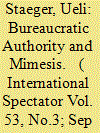

|
|
|
|
|
| Summary/Abstract |
Regional economic integration in the post-Soviet space stands in a complex relation with the European Union’s integration process. Multiple competing internal logics of integration, as well as the EU model are drivers of Eurasian regionalism. The Eurasian Economic Union illustrates how bureaucracies mobilise their technocratic authority in a process of mimesis that reconciles multiple internal and external integration logics: selective learning from the EU and successful incorporation of internal integration logics produce an organisational design and output that member states support to varying extents.
|
|
|
|
|
|
|
|
|
|
|
|
|
|
|
|
| 4 |
ID:
075733
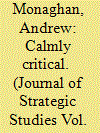

|
|
|
|
|
| Summary/Abstract |
Russia has consistently opposed US hegemony since the early 1990s. Moscow has sought to create a world overseen by the UN Security Council and several power centres supporting an anti-hegemonic axis. Until recently, Russia's resources have been very limited. Russian opposition therefore was largely conceptual or a work in progress. Russian policy was largely reactive - and non-confrontational. However, the failure of the Russia-US relationship to develop practically has highlighted negative views of US hegemony, and the greater wealth generated through high energy prices is supporting an increasingly active Russian policy.
|
|
|
|
|
|
|
|
|
|
|
|
|
|
|
|
| 5 |
ID:
188171
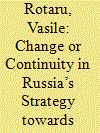

|
|
|
|
|
| Summary/Abstract |
The 2008 invasion of Georgia, followed by the recognition of the independence of the breakaway regions of Abkhazia and South Ossetia, the annexation of Crimea and the involvement in the war in Donbas, and the 2022 invasion of Ukraine have all marked the return to active Russian participation in separatist regions in the ‘near abroad’. They took the international community by surprise. To be sure, the Russian Federation had played a role in all previous secessionist conflicts in the former Soviet space. Nonetheless, Moscow’s post-2008 bold actions – open invasion, recognition of separatist regions and annexation of a neighbour’s territory – have marked an innovation in Russia’s foreign policy. This points to questions about how Moscow is legitimising these actions and whether the official narrative suggests a change in Russia’s strategy towards secessionist conflicts in the ‘near abroad’.
|
|
|
|
|
|
|
|
|
|
|
|
|
|
|
|
| 6 |
ID:
155275
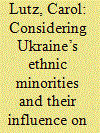

|
|
|
|
|
| Summary/Abstract |
Transnational Ethnic Alliance Theory at its core posits that the majority ethnic group in one state will come to the defense of its ethnic brethren that are a minority in a neighboring state, if that group is facing discrimination or repression. The actions of political leaders in Moscow, who claimed that they were concerned about the Russian minority in Ukraine, suggest that modifications to this theory are necessary. Intervention will only occur when it is in the self-interest of the neighboring state or in the self-interest of the governing elite of that state. Russian perceptions of threats to Russian national interests originating in the West made the interference in the Ukrainian political system more likely. Similar perceptions of threats from abroad to foreign policy interests for other states, or their leaders, could lead to support for ethnic minorities. The resulting modified Transnational Ethnic Alliance Theory can be used as a tool to predict better and explain foreign interference anywhere that ethnic groups overlap between states.
|
|
|
|
|
|
|
|
|
|
|
|
|
|
|
|
| 7 |
ID:
130921
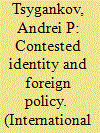

|
|
|
|
|
| Publication |
2014.
|
| Summary/Abstract |
This paper develops a framework for interpreting state international policy by treating national identity as inherently contested. Building on insights from constructivist literature, it proposes a technique for establishing the meaning of foreign policy action on several interrelated levels: state-based, society-based, and international. The paper illustrates the benefits of the approach by selecting the example of Russia's European diplomacy under President Dmitri Medvedev. By studying how officials themselves justify their policies and how these policies are then perceived in broader social and international settings, we have an opportunity to develop a rich understanding of a particular state action, as well as tentatively assess the chances of this action's success or failure.
|
|
|
|
|
|
|
|
|
|
|
|
|
|
|
|
| 8 |
ID:
124962
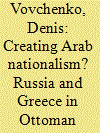

|
|
|
|
|
| Publication |
2013.
|
| Summary/Abstract |
The article discusses Russian and Greek rivalry over the influence in the Patriarchates of Jerusalem and Antioch from the end of the Egyptian occupation to the Young Turk Revolution. While Greece ultimately aimed at including Orthodox Arabs in a Pan-Hellenic nation, Russian private and state actors were motivated by the cultural and political commitment to the defence of Orthodoxy from western inroads. Throughout this period, Russian diplomats were able to continue their traditional partnership with many Ottoman Greek prelates even after the Bulgarian schism of 1872. But when their leadership seemed to be the cause of mass defections from orthodoxy, Russian foreign policy makers from local consuls to the tsar were drawn into supporting the restoration of native Arab control. The article brings fresh archival evidence to put into context the development of some of the earliest modern Arab autonomous institutions. It also contributes to the discussion of the strength of dynastic and religious identities before 1914.
|
|
|
|
|
|
|
|
|
|
|
|
|
|
|
|
| 9 |
ID:
146006
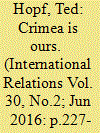

|
|
|
|
|
| Summary/Abstract |
Russia could have annexed Crimea anytime in the last 25 years. The fact that it did so only in March 2014 is a puzzle. I argue that the predominant discourse of Russian national identity by 2014 made the annexation of Crimea and military intervention in eastern Ukraine both thinkable and natural to Moscow. A history of the discursive terrain of Russia from 1992 to 2014 shows how Russia’s national identity has evolved over the years, both in response to Western inactions or actions and domestic developments. But Russian identity is not a sufficient explanation for Russian behavior in Ukraine. For that, we must pay attention to the event itself: Western support for the Maidan protestors, Western failure to adhere to the February 2014 agreements reached with Moscow on a transitional government in Ukraine with Yanukovych at its head and new elections in November, the presence of disgruntled Russians in Ukraine, and perhaps most important, over a decade of US unilateralism in foreign affairs.
|
|
|
|
|
|
|
|
|
|
|
|
|
|
|
|
| 10 |
ID:
121003
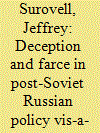

|
|
|
|
|
| Publication |
2012.
|
| Summary/Abstract |
Of all the assumptions pervading the conventional wisdom about Russian foreign policy few have been more universally accepted than Russia's supposed opposition to NATO expansion. Because Russia's principal source of profit has come from rental value of natural resources from the world market, Russia's foreign policy has largely been conducted in the interests of the exporters of those resources. Compliance with NATO expansion, Moscow's decision-makers apparently believe, can only promote the pecuniary interests of that group. Given this dynamic, and confirmed by an examination of the historical record, I conclude that Moscow's leaders have acquiesced to and even supported NATO expansion.
|
|
|
|
|
|
|
|
|
|
|
|
|
|
|
|
| 11 |
ID:
157800
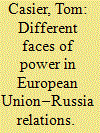

|
|
|
|
|
| Summary/Abstract |
This article applies Barnett and Duvall’s taxonomy of power to European Union (EU)–Russia relations aiming to understand power in its complexity and without a priori theoretical assumptions. Four different types of power – compulsory, institutional, structural and productive – feature simultaneously. It is argued that non-compulsory forms of power are key to understanding the logic of competition in EU–Russia relations in the decade preceding the 2014 Ukraine crisis, despite receiving limited scholarly attention. First, a struggle over institutional power, the capacity to control the conditions of the other actor indirectly, appeared from rivalling integration projects and competing norm diffusion. Secondly, power relations were strongly characterised by constitutive forms of power – structural and productive – in particular the capacity to produce and recognise identities, such as Europeanness. In both fields, the EU held a hegemonic position, which Russia increasingly challenged. The geopolitical reading of the change in regime in Ukraine in 2014 prompted Moscow to a radical change of strategy, by shifting the emphasis in the confrontation to compulsory power. Attempts at direct control, from annexation to sanctions, now dominate relations. Where Russia seeks to prevent the Euro-Atlantic community from gaining effective control over Ukraine through destabilisation, this can be labelled ‘negative’ compulsory power.
|
|
|
|
|
|
|
|
|
|
|
|
|
|
|
|
| 12 |
ID:
112789
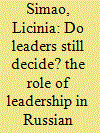

|
|
|
|
|
| Publication |
2012.
|
| Summary/Abstract |
This article looks at Russian foreign policy from the perspective of the individuals responsible for decision making. The focus on the individual level of analysis aims to shed light on the evolving dynamics of Russian foreign policymaking and complement existing analysis on the role of ideas, world views and influential groups in foreign policy analysis, with insights from neo-classical realism and constructivism. Whereas the former sees the state as the transmission belt between international power distributions and political action, the latter underlines the roles of ideas and norms to explain agency. In this context, the article is well placed to deal with the evolving relationship between leaders' views and situational constraints, including other actors involved in setting foreign policy priorities and the external environment. How are decisions taken in the context of Russia's foreign policy under President Putin and Medvedev? What is the role of the presidents from both a legal (constitutional) and a practical perspective? The article maps Russian political leaders' decisions, under Putin and Medvedev, using two case studies: Putin's decision to support the US-led post-9/11 war on terror and Medvedev's decision to go to war with Georgia in 2008.
|
|
|
|
|
|
|
|
|
|
|
|
|
|
|
|
| 13 |
ID:
192931
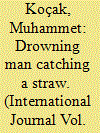

|
|
|
|
|
| Summary/Abstract |
In the mid-2010s Turkey-Russia relations gained a strategic dimension after the two nations began to work together in Syria and took bold steps to cooperate on defence and nuclear energy. This development was commonly regarded as a major shift in Turkish foreign policy. This article argues that the context in which the Turkey-Russia nexus operates is historically rooted. Since the nineteenth century, Russia almost has been the most critical threat to Turkey; and Turkey consistently sought to moderate this threat, mostly with Western assistance. But when Turkey either failed to subdue Russia or there was no significant threat, it would opt for rapprochement with Russia. An examination of the historical background of Turkey-Russia relations helps explain these nations’ contemporary dynamics with one another.
|
|
|
|
|
|
|
|
|
|
|
|
|
|
|
|
| 14 |
ID:
141444
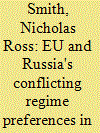

|
|
|
|
|
| Summary/Abstract |
This paper evaluates the competitiveness of the European Union (EU) and Russia's regime preferences in their foreign policies towards Ukraine in the scope of the on-going Ukraine crisis. It is argued that the underpinning geopolitical environment Ukraine currently resides in, wedged between two much larger powers (the EU and Russia), renders it a vulnerable target state for regime promotion from both sides. Indeed, since the 2004 Orange revolution in Ukraine, both the EU and Russia have had discernible regime promotion strategies in their foreign policies. The EU's regime promotion has focussed on facilitating democracy in Ukraine, along with more material interests (trade and strategic aims) while Russia has reacted with increasingly zero-sum policies which pursue its preference for having a loyal and Russian-facing regime in Ukraine. Ultimately, the increasing competitiveness of the EU and Russia has been a key factor in the onset of the Ukraine crisis, which offers important insight into the relationship between large powers and the smaller third states which lie in their overlapping spheres of influence.
|
|
|
|
|
|
|
|
|
|
|
|
|
|
|
|
| 15 |
ID:
114926
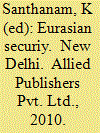

|
|
|
|
|
| Publication |
New Delhi, Allied publishers Pvt. Ltd., 2010.
|
| Description |
xx,159p.
|
| Standard Number |
9788184246414
|
|
|
|
|
|
|
|
|
|
|
|
Copies: C:1/I:0,R:0,Q:0
Circulation
| Accession# | Call# | Current Location | Status | Policy | Location |
| 056803 | 355.00958/SAN 056803 | Main | On Shelf | General | |
|
|
|
|
| 16 |
ID:
189823


|
|
|
|
|
| Summary/Abstract |
By the end of the second decade of the 21st century, the Russian foreign
policy discourse had transformed from hard-headed “sober realism” into
bizarre “values-obsessed realism.” The texts of Russia’s official strategies
now appeal to such aspects of political identity as “spiritual values,”
“cultural (civilizational) code,” “historical truth,” etc. Such appeals,
coupled with almost eschatological rhetoric, are not uncommon in official
speeches of the country’s political leadership. But this shift in political
discourse cannot be explained just by the reaction to the changes in the
international situation after the incorporation of Crimea into Russia.
The author suggests that the reason is a change in the political leader’s
mindset after staying in power for such a long time. As his powers get
extended, almost any political leader begins to think in “historical”
and “global” categories, viewing personnel unchangeability not as
vulnerability, but, on the contrary, as proof of unique “stability” and
“governability.”
|
|
|
|
|
|
|
|
|
|
|
|
|
|
|
|
| 17 |
ID:
124352
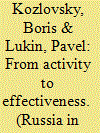

|
|
|
|
|
| Publication |
2012.
|
| Summary/Abstract |
Some four years ago, an author wrote in this journal that the conflict with Georgia would be a watershed that would put an end to Moscow's post-Soviet approach to the world. He believed Russia would finally formulate "a program of realistic and pragmatic foreign policy matching its genuine strategic interests and the goals of economic and social development" (Alexander Lukin, "From a Post-Soviet to a Russian Foreign Policy."
|
|
|
|
|
|
|
|
|
|
|
|
|
|
|
|
| 18 |
ID:
186385
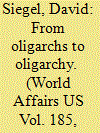

|
|
|
|
|
| Summary/Abstract |
Drawing heavily on theories about Russia's informal politics, American sanctions were designed to change Russian foreign policy by exploiting political conflict among oligarchs and the state elite; however, after nearly eight years of sanctions, Russian elites seem more united than ever. I propose that Russia's oligarchs—the ruthless self-interested economic elite in Russia's informal political system—might sometimes act as a cohesive oligarchy, particularly when their wealth is threatened from external rather than domestic sources, as has been the case under Western sanctions. Through an in-depth case study on the design and outcome of sanctions, this article seeks to develop a more dynamic theory of Russia's informal politics and explain the apparent cohesion among state and economic elites since 2014 as the result of a politics of wealth defense induced by Western sanctions.
|
|
|
|
|
|
|
|
|
|
|
|
|
|
|
|
| 19 |
ID:
163417


|
|
|
|
|
| Summary/Abstract |
Russian foreign policy thinkers have used a succession of geopolitical imaginaries to articulate a Russian role and identity in the post-Cold War era. This essay analyses one such spatial project, the idea of ‘Greater Eurasia’, which imagines a new geopolitical geometry centred on Sino–Russian cooperation. The ‘Greater Eurasia’ discourse provides a new role for Russia in international affairs but also makes far-reaching claims about the nature of the emerging, post-liberal world order. The essay concludes with an analysis of the main challenges to the ‘Greater Eurasia’ project.
|
|
|
|
|
|
|
|
|
|
|
|
|
|
|
|
| 20 |
ID:
112792
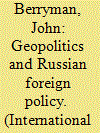

|
|
|
|
|
| Publication |
2012.
|
| Summary/Abstract |
The article provides a broad overview of the fluctuating connections between the controversial and ambiguous field of modern geopolitics and Russia. Given the pivotal significance of the Russian challenge within the early hypotheses of Mahan and Mackinder, the article first explores those distinctive geographical and spatial considerations that helped shape the development of the Russian Empire. The place of geopolitics in the Cold War is then reviewed, including both its policy orientation and the exchanges between the proponents of geopolitical realism and liberal internationalism. In conclusion, the article examines the post-Cold War renaissance of geopolitics, reviewing both theoretical developments and policy implications for Russian foreign policy.
|
|
|
|
|
|
|
|
|
|
|
|
|
|
|
|
|
|
|
|
|